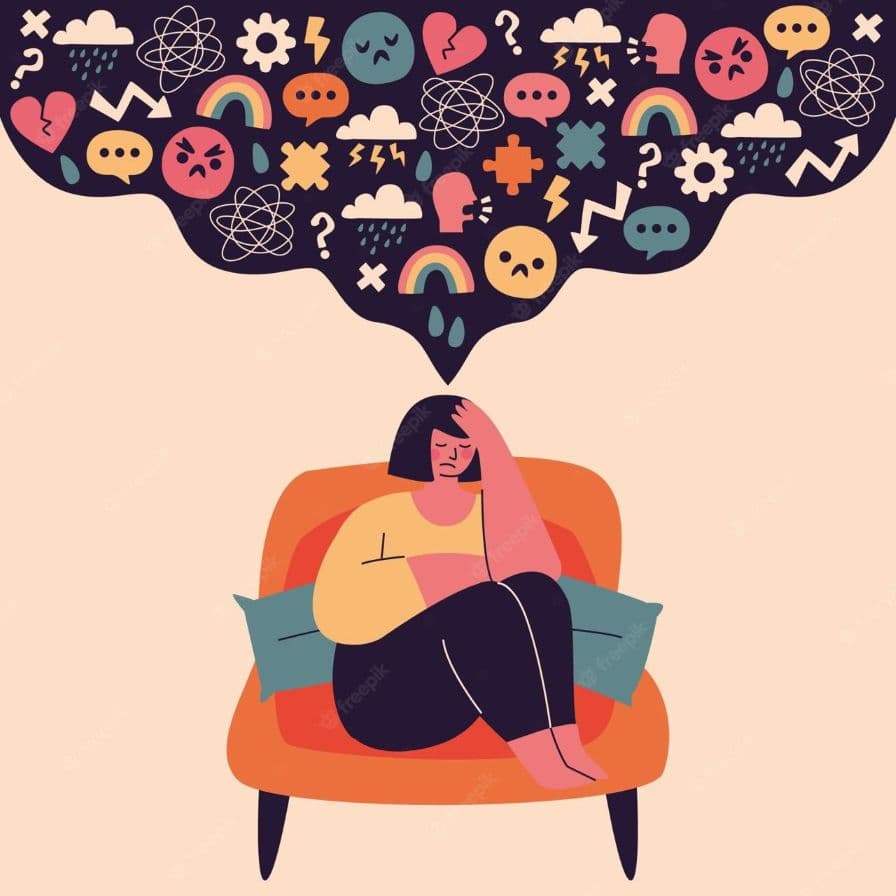Mental Health Awareness and When to Seek Professional Help
Despite growing recognition of mental health as a crucial aspect of overall well-being, stigma, misunderstanding, and a lack of awareness still persist.
Understanding mental illness
Mental illnesses are conditions that affect a person's thoughts, feelings, emotions, behavior, or mood. They can significantly impact how a person functions in their daily life, including their ability to work, maintain relationships, and carry out normal activities.
Who are affected by it?
Mental illnesses are common and can affect anyone regardless of age, gender, race, or socioeconomic background.
Some of the most common mental health disorders include:
1. Anxiety Disorders: These include generalized anxiety disorder (GAD), panic disorder, social anxiety disorder, and phobias. Individuals often experience excessive worry, fear, or nervousness.
2. Depressive Disorders: Major depressive disorder (MDD), dysthymia, and bipolar disorder are examples. Symptoms can range from persistent feelings of sadness to manic episodes with extreme highs and depressive lows.
3. Obsessive-Compulsive Disorder (OCD): Characterized by intrusive thoughts (obsessions) and repetitive behaviors or rituals (compulsions).
4. Post-Traumatic Stress Disorder (PTSD): Occurs after an individual has experienced or witnessed a traumatic event. Symptoms include flashbacks, nightmares, and hyperarousal.
5. Eating Disorders: Conditions such as anorexia nervosa, bulimia, and binge eating disorder, which involve unhealthy eating habits and concerns about body weight.
6. Schizophrenia: A severe mental disorder that can affect a person’s perception of reality, often leading to delusions, hallucinations, and disorganized thinking.
7. Personality Disorders: Borderline personality disorder (BPD), antisocial personality disorder (ASPD), and others that involve persistent patterns of behavior that deviate significantly from societal expectations.
8. Substance Use Disorders: This includes alcohol, cannabis, tobacco, nicotine addiction, etc. that interferes with normal functioning .
Why Awareness is Important?
Early Recognition and Intervention: Many mental health conditions can be effectively managed or even prevented with early intervention.
Recognizing the signs
Some common signs to look out for, including:
1. Persistent sadness or mood swings: While everyone experiences sadness, a prolonged or extreme sense of sadness or emotional highs and lows could indicate depression or bipolar disorder.
2. Excessive worry or fear: Anxiety that interferes with daily life, such as avoiding social situations or constantly feeling on edge, can be a sign of an anxiety disorder.
3. Withdrawal from social activities: If someone becomes increasingly withdrawn, isolates themselves, or loses interest in activities they once enjoyed, it may signal depression, social anxiety, or another mental health concern.
4. Changes in behavior or personality: Significant shifts in behavior, such as becoming unusually irritable, paranoid, or engaging in risky behaviors, might point to a personality disorder or other conditions.
5. Difficulty concentrating or making decisions: Mental illnesses, such as depression or ADHD, can impair cognitive function, making it hard to focus, make decisions, or remember things.
6. Physical symptoms without a medical explanation: Persistent headaches, stomachaches, or unexplained fatigue can sometimes be linked to mental health conditions like anxiety or depression.
7. Substance abuse: Excessive alcohol consumption, cannabis or drug use can sometimes be a coping mechanism for underlying mental health issues, such as trauma, depression, or anxiety.
8. Self-harm or suicidal thoughts: If someone is engaging in self-harm, or expressing thoughts of wanting to die or hurt themselves, it is critical to seek immediate professional help.
When to seek professional help
1. The Symptoms Don’t Improve: If you've been struggling with mental health symptoms for a prolonged period without any improvement, or if they are worsening, it's time to seek professional help.
2. You’re Unable to Function Normally: If mental health symptoms are interfering with your ability to carry out daily tasks such as working, maintaining relationships, or taking care of yourself, professional guidance is crucial.
3. You Have Thoughts of Self-Harm or Suicide: If you or someone you know is experiencing thoughts of suicide or self-harm, it’s important to reach out to a professional immediately.
4. Substance Abuse: If you find yourself relying on substances (alcohol, cannabis, drugs, etc.) to cope with emotional or psychological distress, it is time to seek treatment for both the substance use and any underlying mental health concerns.
5. You Feel Overwhelmed or Helpless: Sometimes, individuals experience feelings of being overwhelmed or unable to cope with life's challenges. Talking to a mental health professional can help address these feelings and provide coping strategies.
How to seek professional help
Therapists and Counselors: Psychologists, counselors, and therapists are trained professionals who can provide talk therapy, cognitive behavioral therapy (CBT), or other types of counseling. Therapy helps individuals address issues in a structured environment.
Psychiatrists: Psychiatrists are medical doctors specializing in mental health. They can diagnose mental health disorders, prescribe medications, and provide therapy if needed. Psychiatric consultations are often necessary for serious conditions like schizophrenia or severe depression.
Hotlines: Crisis helplines, such as the Suicide Prevention helpline, are available 24/7. If you or someone you know is in immediate danger or crisis, these services can offer immediate support.
Online Resources: Many organizations offer telehealth services, online counseling that provides access to therapists or mental health professionals remotely.
Conclusion
Recognizing the signs and symptoms of mental health issues can empower individuals to seek the help they need when necessary. If you or someone you know is struggling, reaching out for professional help is an important and effective step toward healing and recovery. Mental health professionals, therapy, are key resources in navigating the path to better mental health.
